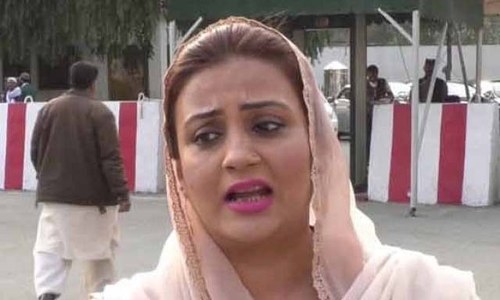ISLAMABAD: Unreliable estimation of the size of the wheat crop and delays in taking appropriate decisions are being blamed for a wheat flour crisis that has been in the making for some time, Dawn has learnt from knowledgeable sources.
A crisis had already begun to brew as far back as May last year when the authorities were alerted to the possibility of a wheat shortage, but the government took cosmetic measures like imposing a ban on export of the commodity. Even that decision by the Economic Coordination Committee (ECC) of the cabinet about the ban came late in the day after the food security ministry had sent several reminders to it.
Background interviews and conversations with officials of the relevant departments have revealed that reporting on crop estimates is often faulty and this has caused crises in the past as well. For instance, in 2007-08 wheat was exported in sizeable quantities at lower prices after it was wrongly estimated that the country would get a bumper crop.
A similar error in estimating the size of the crop was committed in 2014, which led to panic buying and import of wheat in May and August of that year.
Official says no other system exists to estimate crop or monitor output
Under the existing scheme, crop reporting systems in the provinces inform the federal government about the crop production and estimation data. “No matter how reliable this system is, we have to depend on it,” an official of the food security ministry told Dawn.
According to him, the federal government has no other system to estimate the crop or monitor production. The decision to export wheat also comes from the provincial governments. “We have documentary proof about crop reporting, stocks and export permissions,” he said.
Based on an assumption about surplus wheat in the country, former prime minister Shahid Khaqan Abbasi on April 27, 2018 — that is, before the last general elections — allowed the Pakistan Agricultural Storage and Services Corporation (PASSCO) to export 0.5 million tonnes of “surplus wheat” at a rebate of $155 per tonne through the sea route.
Following in Mr Abbasi’s footsteps, the ECC headed by then finance minister and present Planning Minister Asad Umar allowed export of 0.5m tonnes of wheat on Nov 20, 2018, with a subsidy amount of $105 per tonne.
The allocated quotas were 0.1m tonnes for PASSCO and 0.4m tonnes to be shared by Punjab and Sindh. The decision was taken on the request of the two provinces and PASSCO.
When the decision was made, it was reported that the country had a total wheat stock of 10m tonnes.
On the first day of last year, the ECC headed by Mr Umar allowed export of another 0.5m tonnes of wheat. The quotas allocated for export were 0.1m tonnes for PASSCO, 0.25m tonnes for Punjab and 0.15m tonnes for the Sindh government.
As per the ECC decision, the export of wheat and wheat products was to be completed by April 30, 2019, while the entire process, including codal formalities of the exporters, was to be completed by June 30.
On April 17, it was reported that the country had a total of 28.16m tonnes of wheat, including leftovers from the previous year. In May, a completely new scenario was being presented and panic began to set in.
The response from the food security ministry came in the shape of a summary that was sent to the ECC three times in June, calling for a ban on exports. The ban, however, was imposed on July 25, 2019.
Between July 2018 and June 2019, the total quantity of wheat exported was recorded at 689,487 metric tonnes. But the details, according to the ministry official, paint a rather different picture that passes the buck to the previous government.
He said the Pakistan Tehreek-i-Insaf (PTI) government allowed the export of 1m tonnes of wheat, but the total amount of the commodity exported came to 163,000 metric tonnes. The remaining quantity of 526,487 metric tonnes exported was the outcome of previous government’s decision that was implemented in letter and spirit by the incumbent government.
In the last year of the Pakistan Muslim League-Nawaz (PML-N) government (2017-18), a total of 1.19m tonnes of wheat was exported, which is the highest quantity to be exported in the last 10 years.
Despite a ban, data from the Pakistan Bureau of Statistics shows that between July and Dec (2019-20) a total of 48,083 metric tonnes of wheat was exported. “We are investigating how this happened despite a ban on wheat exports,” the official said. He, however, added the bureau might have committed an error and reported the export of wheat by-products as that of wheat.
The annual wheat production in the country has ranged from 21m tonnes to 25m tonnes over the last 10 years. Wheat flour accounts for 72 per cent of Pakistan’s daily caloric intake with per capita wheat consumption of around Rs124 kg per year, one of the highest in the world. This is the reason why an increase in wheat price causes political unrest in the country.
Under the Rules of Business of 1973, the food security ministry is responsible for keeping a watch over the prices of food grains and foodstuff imported or those required for export.
According to a senior ministry official, the ECC has been briefed on a weekly basis on the evolving situation ever since the emergence of the wheat crisis. “We are constantly updating the ECC over the wheat situation in the country,” he said, adding it was the responsibility of the decision-making forum to timely order corrective measures.
He said the federal government had allowed dispatch of 850,000 metric tonnes of wheat to Sindh and Khyber Pakhtunkhwa to improve supply to the flour mills. However, a strike by transporters added to the problems by causing delays in transporting wheat to the two provinces.
On Jan 22, Prime Minister Imran Khan ordered a high-level inquiry to identify the reasons behind the shortage of wheat or wheat flour and fix responsibility for it. The inquiry will also look into the issue of transporters’ strike that added to the crisis.
An estimated 50pc of the wheat crop is consumed on the farm or within the village where it is produced and is not traded in the market. Usually 25pc of the total produce is procured by the public sector agencies at a set purchase price (currently Rs1,350 per 40 kg). The remaining 25pc of the crop is purchased by the private sector. The government largely controls the wheat marketing system.
Wheat prices and the movement of wheat are controlled at the provincial and district levels. The federal government controls the market through a minimum guaranteed support price and an issue price for wheat sold to flour mills.
In Pakistan, wheat is planted from October to December and harvested in April-May. The estimates for the upcoming crop can be realistically made by February-March on the basis of the area under cultivation, water availability and climatic conditions.
Published in Dawn, January 27th, 2020















































